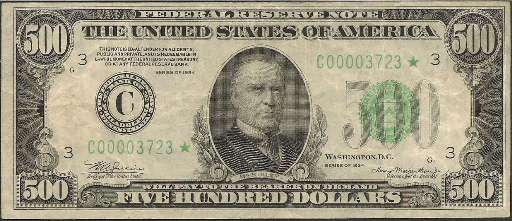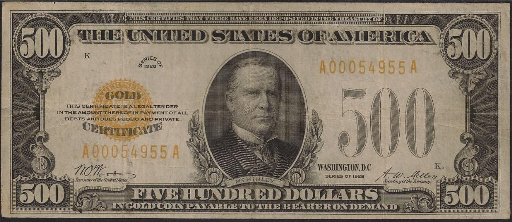Attn: Collectors and Dealers – Avoid New Scams
Anyone involved in numismatics is especially aware of the scams that are out there these days. Fortunately, most scams are related to coins. Fake collector coins and precious metals scams are worse today than ever before. Paper money is usually viewed as a safer area. It is safer in large part thanks to serial numbers which make every note unique. I wanted to take a few minutes to share the details of a couple of scams we almost feel victim to in the past year.
Scam 1: BackPage / Craigslist Too Good To Be True Deal
The first red flag is that someone was trying to sell something of true value on Craigslist and Backpage. We should all know what Craigslist is by now, but some of you might be less familiar with backpage. Backpage is basically just a free classifieds site. Both sites are a great place to sell a sofa, but you probably shouldn’t try to buy or sell rare collectibles on either site.
So we were approached by someone in Arizona stating that a friend of his had just listed two $500 notes for sale on both Craigslist and Backpage. I am pretty sure the seller just wanted twice face value. The gold note was probably worth $6,000 at the time, and the star was probably worth $3,000. So $2,000 for the pair would have been a steal. We advised the person who contacted us to secure the notes right away and told him that we would pay a hefty profit above the asking price. That is where things got sticky.


The person in Arizona gave us the email and phone number of his friend. The number had a Delaware area code. We called it and spoke to the owner of the $500 bills. He didn’t have an accent. According to him he had just got married and was on an extended honeymoon in Russia. He received the two $500 bills in Russia at face value from a contact at a money exchange shop. He now wanted to double his money. He indicated that he would be flying back into Baltimore in a few weeks and that he would meet at the airport, but he was entertaining other offers and might have them sold before then.
The scam is deceptive for several reasons. The initial contact is made by someone other than the seller. This adds some credence, the same way a word of mouth testimonial might help a retail product. Secondly, the two bank notes he is selling are both new to the census. There are accurate censuses of known $500 gold certificates and $500 star notes. So that means that the scammer might actually have possession of the currency. People frequently steal images off of auction websites or dealer sites and try to represent themselves as being the owner. However, it is easy to track the serial number back to the true owner. You couldn’t do that with these $500 bills. They were totally fresh and new to the market, adding further validity to the idea that they could actually have been turned in for face value somewhere in Russia.
The scammer also does two classic sales techniques. He presents the idea that there are other buyers and that if you don’t take swoop on the deal soon that it will go away. He also makes it sound like he is just a traveling American. The Delaware cell phone number was also a nice touch. And the fact that he is willing to meet at the airport is especially tricky. We decided to pass on the deal mostly because he wanted to get paid via Western Union in Russia. We later learned that he had the same $500 bills posted for sale on about 100 different websites. I am sure plenty of people sent him money. We dodged a bullet on that one.
Scam 2: Ended Ebay Listing / Skrill Scam
This happened just a couple of weeks ago. Someone in North Carolina, about four hours away from us, listed a nice national bank note on ebay. If you deal with national bank notes at all, then you know that ebay is probably the last place you want to sell them. The auctions get ended early or people end up playing bidding games. However, if an auction does actually complete and it is legit, then the prices are pretty low due to the lack of sophistication of most ebay bidders. So we contacted the seller and advised that he had a rare note and not to end the auction early for someone offering 10% of the true value (and that happens frequently).
As expected, a few hours later the auction had completely disappeared. Several days later we got a response to our message. The seller indicated that business had required him to leave North Carolina and immediately go to Spain. He had packed the bank note with him because he intended to sell it while in Spain. However, if we were still interested then he would sell it for $2,200. Now that was not a steal by any means. The retail price was probably $2,500. With that said, 10% was enough room so we said we would buy it. This is the exact message we got:
“My bank note is not on ebay anymore, but it’s still available for sale.
My usual schedule has been changed and I had to go to Spain to take care of some business and that’s why I closed my auction.
The final price for the note is US $ 2,200.00 including all the shipping costs and insurance.
Also I want to let you know that you will have the opportunity to receive and inspect the note before you actually pay for it. If you are interested and want to know more details regarding the purchase just contact me.”
So there are two red flags there. First the seller refers to US dollars. Americans don’t do that. Secondly, he, without being prompted, offers an inspection period. A few emails later he asked to be paid via MoneyBookers (aka Skrill). Now we had never even heard of that service before. It is completely legitimate though and is an accepted payment method on ebay. The seller said that we could pay him through Skrill. The money would be held in escrow until we had the bank note and authorized the funds to be released. This is where the deal falls apart. Skrill does not offer any escrow services and in fact there is a section on their website specifically saying this is a common scam that people try to run. Unlike paypal, Skrill has no buyer protection for such transactions. The seller also said he could not do an escrow.com transaction because he was in Spain (even though escrow.com supports international deals). He also wouldn’t meet a friend of ours in person in NC when he got home. We heard enough excuses that we decided to pass completely.
The part that made this scam so good was that all of the details checked out. The bank note he was selling was new to the census. He also wanted a very realistic price. He used a very unique but American name. The name was in the phone book for the small NC town where he claimed to be from. We never spoke on the phone, so we aren’t sure if he was stealing the identity of the person (a white male in his 60s) in North Carolina, or if that person was somehow involved.
I think the moral of both stories is that if people start making excuses and they are not in the United States, then just pass on the deal. By the way, the email used by the Russian scammer was, aoyakovlev@ovi.com, and the Spain scammer was, geosautter1@gmail.com. Perhaps that will information will keep someone else from getting scammed.
Think you might be falling for a scam? Tell us about it. We would be happy to share our opinion. Sometimes deals that are too good to be true actually come through, but very rarely. Sales@AntiqueMoney.com


